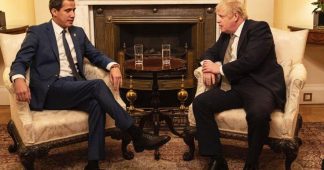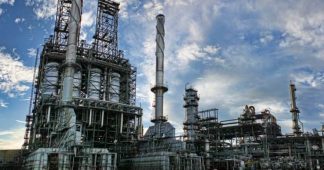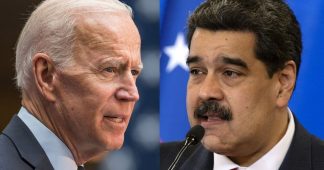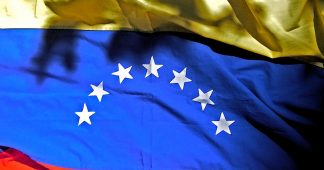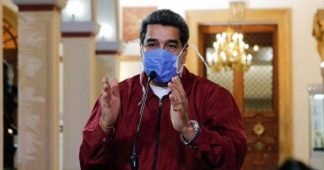By Gabriel Hetland
23 December 2022
Over the last decade Venezuela has suffered the worst crisis in modern Latin American history. This crisis is far from over, but there are growing signs the country may be turning a corner. Economic indicators are more positive than they have been for years. The political situation appears to be stabilizing, with the Juan Guaidó debacle seeming to be nearing its end and government-opposition talks resuming after a year long pause. While relations with the United States remain frosty, there are indications a thaw may be coming. It is far from clear what all this means for the lives of ordinary Venezuelans, the prospects of a return to electoral democracy, or the possibility of a renewal of genuine leftist politics. A degree of cautious optimism may be warranted, though the extent to which the country is entering a ‘new normal’ and the nature of this remain uncertain.
If a new era is beginning, it is decidedly not a socialist one. In recent years, President Nicolás Maduro has implemented a series of free-market reforms. In 2019, Maduro scrapped Venezuela’s foreign exchange system and allowed a de facto dollarization process to unfold. Economists, including from the left, had long called for the elimination of Venezuela’s byzantine currency regime, which facilitated incredibly high levels of corruption and was a major factor in the economic crisis. The government has also established special economic zones (the most infamous being the Orinoco Mining Arc), sold shares of state-owned enterprises on the stock market, aggressively courted private capital, and granted businesses the right to import goods duty free. One effect has been to spur the formation of new businesses, such as the ‘bodegones’ that have proliferated across Caracas, new stores selling high-end imported goods usually paid for in dollars.
The bodegones point to one major consequence of economic liberalization: rising inequality. This has been exacerbated by the unevenness of dollarization. According to Reuters, as of May at least 63% of private-sector employees were paid in dollars, giving them enhanced purchasing power. Public-sector employees by contrast are still largely paid in bolívares. The situation is harder still for the vast numbers working in the informal sector, who continue to struggle to make ends meet. The extensive and continuing deterioration of the state’s capacity, due in no small measure to the devastation wrought by US sanctions, means that the poor are increasingly left to fend for themselves. And this is to say nothing of the millions who have left Venezuela in recent years and are living in precarious conditions elsewhere.
Maduro can nevertheless boast of the resumption of economic growth. 2021 saw growth of 1.9%, according to Bloomberg News. While modest, this reversed a seven-year contraction that cumulatively wiped out 80% of Venezuela’s GDP. Bloomberg estimates that growth will top 8% in 2022. Venezuela has made significant, if uneven, progress bringing down inflation. Hyperinflation (understood as monthly inflation over 50%) ended in 2021 and inflation was significantly down for much of 2022. While it remains high in comparative and historical terms, and Bloomberg reports a marked and worrisome increase in recent months, the current figures are orders of magnitude better than the hyperinflation existing between late 2016 and 2020.
Oil production has also increased and now stands at almost 700,000 barrels a day, double that of two years ago. Production though remains less than a third of the nearly 2,500,000 barrels a day Venezuela produced as late as 2016, and less than a quarter of the historic high of almost 3,000,000 daily barrels in 2002. A major reason oil production has not recovered more from its precipitous decline in 2016 is the persistence of US sanctions.
The overall effect of the sanctions regime has been nothing short of catastrophic. A 2019 report by the Center for Economic and Policy Research argues that sanctions led to 40,000 additional deaths in 2017-2018. And this was before the Trump administration imposed a near-total oil embargo on Venezuela in 2019 as part of its ‘maximum pressure’ campaign to remove Maduro. There has been an immense additional cost to Venezuela’s economy from foreign companies and governments ‘over complying’ with sanctions, for fear of running afoul of the US government and losing access to global markets. As Mark Weisbrot has argued, this predates Trump, with sanctions levied by Obama from 2015 serving to isolate Venezuela from the global economy. The US government has also directly pressured companies not to do business with Venezuela.
The agreement struck on 26 November to partially ease US sanctions is therefore quite significant. It grants the United Nations control of around $3 billion in funds seized by the US government, which will be used to pay for much-needed medicine and other humanitarian aid. Following the agreement, the US Treasury department announced that it will permit Chevron to resume some operations within the country. There are major limitations. The agreement is only for 6 months; it will not provide direct revenue to the Venezuelan government; the amount of aid it will deliver is a tiny fraction of what is needed. The aid will, however, be meaningful. And the agreement holds out promise of further easing of sanctions in the future.
Biden’s willingness to shift US policy stems at least in part from the Republican Party’s increasingly firm hold over Florida politics. This has weakened the influence of rightwing Venezuelan and Cuban expats over the Democratic Party. With Florida appearing to be beyond the party’s reach, Democrats appear willing to adopt less extreme policies towards the two countries, although much remains to be seen. The regional move to the left in Latin America, in countries such as Bolivia, Chile, Colombia, and most recently Brazil, has also created a climate more conducive to positive US engagement with Venezuela, with Colombia’s Gustavo Petro playing a particularly important role. War in Ukraine is another significant factor. Washington engaged in its first high-level talks with Maduro in March, just days after Russia’s invasion; the need to secure additional sources of oil was clearly spurring the Biden administration on.
On the Venezuelan side, the November 26 agreement and resumption of government-opposition talks from which it stems are indicative of an ongoing political shift. Opposition leaders have increasingly distanced themselves from Juan Guaidó and his ‘interim government’. Several of the main opposition parties have indicated that they will not support renewing Guaidó’s (dubious) mandate for another year and are moving to strip him of his control over Citgo. Opposition leaders, including Henrique Capriles, are pushing for unity around a single candidate ahead of scheduled 2024 presidential elections, with plans for a primary to be held in 2023. This marks a major alteration in strategy: returning to the electoralism that prevailed amongst the majority of the opposition from 2006-2015. The US continues to officially recognize Guaidó as Venezuela’s legitimate president, but this has not stopped the Biden administration from engaging with Maduro. Biden sent several envoys to Caracas this year and there are growing calls for the US to recognize the reality that Maduro is Venezuela’s only president.
These developments raise a host of questions, including how the poor, who now comprise the vast majority, are faring. Anecdotal accounts suggest they have generated rising hopes. But the reality on the ground remains immensely difficult. As Pablo Stefanoni writes, in the face of greatly diminished state services and continued economic difficulties, poorly paid workers have been forced to become ever more inventive to survive by engaging in a variety of side hustles, or ‘killing tigers’. The ‘bodegonization’ of Venezuela may be a boon to elites seeking luxury goods, but it is of limited use to the poor. Yet, as Jessica Dos Santos notes, ‘the situation was so critical that just a bit of air is a big relief’. As with so much else, ending sanctions is key to improving life for ordinary Venezuelans. Though by no means imminent, the prospects for ending the sanctions regime appear more hopeful than they have for several years.
This brings us to the issue of how and when electoral democracy might return to Venezuela. The US has made any such easing contingent on getting Maduro to agree to hold presidential elections that are ‘free and fair’. Maduro, for his part, has declared he will hold such elections only after US sanctions are fully lifted. For all his failings, Maduro has a point that genuinely free and fair elections cannot take place without this. Otherwise, the situation is akin to that of Nicaragua in 1990, when citizens understood – and indeed were made to understand – that voting out the Sandinistas was the only way to bring about peace. Lifting sanctions would also remove one of Maduro’s crutches: his ability to point, with some justification, to the US as the main obstacle to peace and stability within Venezuela. If sanctions were to end, Maduro’s appeals to ‘rally round the flag’ would lose much of their substance. The reality of his rule would become all the clearer, as would the need for wholesale transformation of the country’s electoral institutions and judiciary.
Venezuela remains a highly repressive state. In its most recent report – issued in September of this year – on human rights in Venezuela, the UN Office of the High Commissioner on Human Rights argues that Maduro’s government is guilty of crimes against humanity. The report also condemns abuses in the Orinoco Mining Arc, detailing how state and non-state actors have committed violence against Indigenous communities. Attention is also given to sexual and gender-based violence there. Michelle Bachelet, who ended her tenure as High Commissioner in August, provided a modestly more optimistic view in June. Condemning ongoing rights violations, she offered the government praise for some reforms, including shutting down the notorious Special Action Forces (FAES) in May (though critics argue that this amounts to little more than a rebranding). Bachelet also noted that they had recorded ‘fewer deaths in the context of security operations’ than in previous years. It should be noted that the UN’s work has made limited mention of US sanctions, a point that has led to criticism from those more supportive of the Maduro administration.
Repression within Venezuela has been directed not only against the right but also the left. Leftist parties that oppose Maduro, such as Marea Socialista, have been prevented from registering for elections. In May 2021 the leftist human rights collective Surgentes issued a report titled ‘Giro a la derecha y represión a la izquierda’ which details Maduro’s recent economic policies and repression of workers, peasants, and sectors of the left. It mentions, for example, the case of the website aporrea.org, for years a space for debate on the left, that has been largely blocked by the state communications agency, CANTV, since 2019; the 2020 closing of the Jirahara Communitarian Radio station in Yaracuy; the 2020 eviction of the Residencias Estudiantiles Livia Gouverneur in Caracas, which housed Chavista university students, and detention of student leaders who opposed the eviction; and the detention and intimidation of militants with the Alternativa Popular Revolucionaria, which grouped together leftist parties that identified as Chavista but opposed Maduro ahead of the 2020 parliamentary elections.
State repression, alongside the continuing effects of the economic crisis, is a major reason that the left’s immediate prospects are daunting. There are, however, at least a few reasons for cautious optimism here too. One is that, despite its repressive character, the Venezuelan state remains somewhat responsive to pressure from below. For instance, over the summer public-sector education workers repeatedly mobilized against the government’s decision to pay their annual bonus in installments and calculate it with a formula that would have resulted in a much smaller payment. In August the government agreed to their demands. It should also be noted that there remains a leftist current within the ruling PSUV, which has continued to pressure party leaders despite tremendous obstacles. Maduro has long used conflict with the opposition and the US to deflect criticism from the left, portraying it as aiding the enemy. To the extent that a thawing of tensions continues in the coming year, there should be more space for leftist dissent.
We remind our readers that publication of articles on our site does not mean that we agree with what is written. Our policy is to publish anything which we consider of interest, so as to assist our readers in forming their opinions. Sometimes we even publish articles with which we totally disagree, since we believe it is important for our readers to be informed on as wide a spectrum of views as possible.
